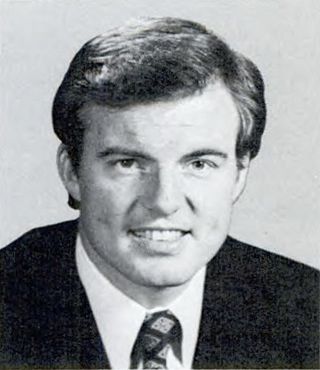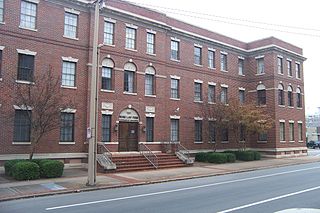
Vincent Walker Foster Jr. was an American attorney who served as deputy White House counsel during the first six months of the Clinton administration.
The Whitewater controversy, Whitewater scandal, Whitewatergate, or simply Whitewater, was an American political controversy during the 1990s. It began with an investigation into the real estate investments of Bill and Hillary Clinton and their associates, Jim and Susan McDougal, in the Whitewater Development Corporation. This failed business venture was incorporated in 1979 with the purpose of developing vacation properties on land along the White River near Flippin, Arkansas.

James Guy Tucker Jr. is an American former politician, businessman, and attorney who served as the 43rd governor of Arkansas from 1992 until his resignation in 1996 after his conviction for fraud during the Whitewater affair. A member of the Democratic Party, he previously served as the 15th lieutenant governor, state attorney general, and as a U.S. representative.

Susan Carol McDougal is a real estate investor who served prison time as a result of the Whitewater controversy.
The Hunting of the President is a 2004 English-language documentary film about former US President Bill Clinton. Clinton and his wife Hillary Clinton appear in archived footage. The film is based on the book The Hunting of the President: The Ten Year Campaign to Destroy Bill and Hillary Clinton, written by investigative journalists Joe Conason and Gene Lyons, and published by Thomas Dunne Books in 2000. Narrated by Morgan Freeman, the film premiered at the 2004 Sundance Film Festival.
Bill Clinton was criticized for some of his presidential pardons and acts of executive clemency. Pardoning or commuting sentences is a power granted by the Constitution to sitting U.S. presidents. Scholars describe two different models of the pardons process. In the 'agency model' of pardons the process is driven by nonpolitical legal experts in the Department of Justice. In contrast, Clinton followed the 'presidential model', viewing the pardon power as a convenient resource that could be used to advance specific policy goals.

Rose Law Firm is an American law firm headquartered in Little Rock, Arkansas.
Madison Guaranty Savings and Loan Association was a savings and loan association based in Little Rock, Arkansas. The company operated from 1979 until 1989 when it was shut down by federal regulators as a result of bank failure, leading to a loss of $60 million for the Federal Deposit Insurance Corporation. Beginning in 1982, the bank was owned and managed by Jim McDougal, a friend of Bill Clinton and Hillary Clinton. On March 8, 1992, during the 1992 United States presidential election the bank was the subject of an article in The New York Times by Jeff Gerth, which linked the bank to Whitewater Development Corporation, owned by McDougal and the Clintons. After Clinton's election as president, the bank was the subject of investigations by the United States Congress and special prosecutor Ken Starr as part of the Whitewater controversy. McDougal was investigated to determine if he improperly diverted money from the bank to Whitewater or the Clinton campaign during the Arkansas gubernatorial election, 1984.
James Bert McDougal and his wife, Susan McDougal, were financial partners with Bill Clinton and Hillary Clinton in the real estate venture that led to the Whitewater political scandal of the 1990s. Starting in 1982, McDougal operated Madison Guaranty Savings and Loan Association.
Robert Bishop Fiske Jr. is an American trial attorney and a partner with the law firm of Davis Polk & Wardwell in New York City. He was the United States Attorney for the Southern District of New York from 1976 to 1980 after earlier having served as an assistant in the office from 1957 to 1961.

The Financial Institutions Reform, Recovery, and Enforcement Act of 1989 (FIRREA), is a United States federal law enacted in the wake of the savings and loan crisis of the 1980s.
David Hale is a former Arkansas municipal judge and banker. His allegations of criminal behavior resulted in the Whitewater scandal trials.
Laura Jean Lewis is a former senior investigator for the Resolution Trust Corporation. She is credited with initiating the Whitewater investigation against President Bill Clinton.
John Latham is a former CEO of Madison Guaranty that came into front page national news due to the Whitewater investigations.
The Senate Whitewater Committee, officially the Special Committee to Investigate Whitewater Development Corporation and Related Matters, was a special committee convened by the United States Senate during the Clinton administration to investigate the Whitewater controversy.
Deputy White House counsel Vince Foster was found dead in Fort Marcy Park off the George Washington Parkway in Virginia, outside Washington, D.C., on July 20, 1993. His death was ruled a suicide by five official investigations.
Stephen A. Smith is a University of Arkansas communications professor who was a top gubernatorial aide to Bill Clinton in Arkansas, helping the governor run his office. He is an internationally known First Amendment scholar and author of numerous books.
Castle Grande was a real estate development in Arkansas about 10 miles south of Little Rock. It came into National news as a result of the Whitewater investigations. The project was a 1,050-acre (4.2 km2) lot where Jim McDougal hoped to build a microbrewery, shopping center, a trailer park and other future projects in 1985. The land was scrub pine forest that had failed already as an industrial development. The sales price was $1.75 million. State regulations prohibited Jim McDougal from investing more than 6% of his Madison Guaranty S&L assets. So, he put in $600,000 of Madison money and then for the difference had Seth Ward put in the remaining $1.15 million. This money Ward borrowed from Madison Guaranty on non-recourse, no personal obligation to repay. If federal regulators found out, McDougal's S&L could be shut down, since it had already been operating under orders to correct its lending practices.
James M. Lyons is an attorney at law in Denver, Colorado.
William H. Kennedy III is an American lawyer from Arkansas, who served as Associate White House Counsel during the Clinton administration.




